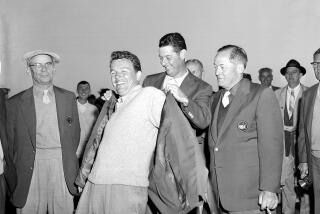BRITISH OPEN : Hopes Wouldn’t Be Dashed Again
SOUTHPORT, England — The pregnant woman walked beyond the restraining ropes, unable to restrain herself. Stomach swelling up, tear ducts welling up, Jennie Baker-Finch started crying now because she knew her husband would soon. There was a child in her arms, a baby Baker-Finch in her future and another little slice of heaven a few hundred yards up ahead.
“I’m just so happy for him,” she said, dabbing at her eyes, “because I know what this means to him.”
Which is what?
“Everything,” she said.
Her husband’s day’s pay would come to 90,000 British pounds, or close to $150,000. For such rewards and for more salient reasons that she was carrying around with her Sunday as she proceeded parallel to him along the 18th fairway, Jennie was terribly glad that Ian got around to asking her out on their first date during a golf event where she had been working for the tournament director.
Once she got married, the first thing Jennie did was get rid of her maiden name, because her Australian mate came equipped with everything, including a hyphenated surname. Two hyphens might have seemed a tad extreme, not to mention a lot of letters to stencil onto a mailbox.
They made their home in a coastal resort called Sanctuary Cove, just above Surfer’s Paradise on the northeast side of the isle near Queensland, and set about living happily ever after. Ian was a country boy whose parents ran a chicken ranch and piggery in the middle of nowhere. Among the things he didn’t have was a high school diploma. He had dropped out of school as soon as he turned 16.
Neither feeding the farm animals nor reading homework assignments appealed to Ian, who went out on his own, he said, because: “It was a lot more beneficial to me than learning how to write essays or learning history.”
Looking back on it now, it couldn’t have turned out much better, but the part of his conscience that reminds one of golf’s nicest guys that his own daughter had better finish school someday or else makes him regret not completing his formal education. Baker-Finch wouldn’t recommend to everyone taking the course in life that he eventually did, which turned out to be a golf course.
He got his handicap down to 13 without so much as a lesson. How was his father going to keep Ian down on the farm, after he’d seen par-threes?
One day he took the Queensland Schoolboy Championship in his age group. He began to build himself a reputation in Australian junior golf, which already was populated by young prodigies such as Mike Harwood, Wayne Grady and Peter Senior, an older boy named Greg Norman who dominated everybody else and a few other juveniles who--although none dreamed it then--would find themselves in far-off 1991 fighting for the championship of the empire’s most famous tournament, the British Open.
“I used to kick . . . his . . . (butt),” Harwood said, laughing, slowly enunciating each word.
After settling for second place behind Baker-Finch here, Harwood could afford to be generous. His own take-home pay amounted to something like $115,000, American, which made the man whose name sounds like a golfing utensil take home considerable solace in defeat and plenty of pride in his friend’s success, saying: “Australian golf means Norman to most people in America, but they will certainly know about Ian Baker-Finch from now on.”
He is the guy who choked back sobs Sunday when they placed the silver victor’s trophy in his hands.
Baker-Finch looked lovingly at the loving cup, trying to think of something clever or appropriate to say, until finally he blurted out before tens of thousands surrounding the 18th green: “Let’s fill it up with something nice and cold and really enjoy it.”
He’s Australian, all right.
Jennie Baker-Finch had watched him playing Sunday morning with their daughter in the garden outside their rented home, noticing how relaxed he looked before leaving for work. In her heart, she suspected that his heart was fluttering, knowing how desperately he feared letting the prize slip through his fingers, as it had more than once before.
“He was calm the way he always is,” Jennie said, “but I know that he would feel cheated if this one special thing would keep getting away from him. That’s why I cried coming up the 18th fairway, because I understood what he would be feeling.”
She threw her arms around him when the tournament was won, careful not to jostle the baby inside her, due in two months. There came a captivating moment an hour later when the blazer-and-necktied members of the Open’s tournament committee took Ian aside and sat him down and serenaded him with “Waltzing Matilda,” and then some photographers asked if the Baker-Finches would pose for a family portrait inside one of the golf course’s bunkers.
They sat in the sand. Ian helped his wife get comfortable. The 2-year-old, Hayley, started howling. As the photographers snapped away, the child squirmed away from her parents, found a softer place nearby, crossed her legs inside this makeshift playpen and spontaneously began to answer nature’s call.
The new champion of the British Open excused himself, scooped up his daughter and carried her behind a grandstand, where she could complete her business in private. A golfer’s work is never done.
More to Read
Go beyond the scoreboard
Get the latest on L.A.'s teams in the daily Sports Report newsletter.
You may occasionally receive promotional content from the Los Angeles Times.










